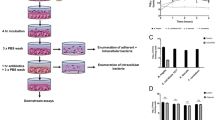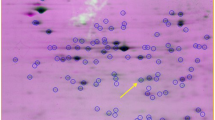Abstract
pks+ Escherichia coli (E. coli) triggers genomic instability in normal colon cells which leads to colorectal cancer (CRC) tumorigenesis. Previously, we reported a significant presentation of pks+ E. coli strains in CRC patients’ biopsies as compared to healthy cohorts. In this work, using an in vitro infection model, we further explored the ability of these strains in modulating cell cycle arrest and activation of apoptotic mediators in both primary colon epithelial cells (PCE) and CRC cells (HCT-116). Sixteen strains, of which eight tumours and the matching non-malignant tissues, respectively, from eight pks+ E. coli CRC patients were subjected to BrDU staining and cell cycle analysis via flow cytometry, while a subset of these strains underwent analysis of apoptotic mediators including caspase proteins, cellular reactive oxygen species (cROS) and mitochondrial membrane potential (MMP) via spectrophotometry as well as proinflammatory cytokines via flow cytometry. Data revealed that all strains exerted S-phase cell cycle blockade in both cells and G2/M phase in PCE cells only. Moreover, more significant upregulation of Caspase 9, cROS, proinflammatory cytokines and prominent downregulation of MMP were detected in HCT-116 cells indicating the potential role of pks related bacterial toxin as anticancer agent as compared to PCE cells which undergo cellular senescence leading to cell death without apparent upregulation of apoptotic mediators. These findings suggest the existence of discrepancies underlying the mechanism of action of pks+ E. coli on both cancer and normal cell lines. This work propounds the rationale to further understand the mechanism underlying pks+ E. coli-mediated CRC tumorigenesis and cancer killing.






Similar content being viewed by others
Data availability
The datasets generated during the current study will be available from the corresponding author on reasonable request.” The data will be deposited at Open Science Framework.
References
Bishehsari F (2014) Epidemiological transition of colorectal cancer in developing countries: environmental factors, molecular pathways, and opportunities for prevention. World J Gastroenterol 20(20):6055. https://doi.org/10.3748/wjg.v20.i20.6055
Blazkova H, Krejcikova K, Moudry P, Frisan T, Hodny Z, Bartek J (2010) Bacterial intoxication evokes cellular senescence with persistent DNA damage and cytokine signalling. J Cell Mol Med 14(1–2):357–367. https://doi.org/10.1111/j.1582-4934.2009.00862.x
Brentnall M, Rodriguez-Menocal L, De Guevara RL, Cepero E, Boise LH (2013) Caspase-9, caspase-3 and caspase-7 have distinct roles during intrinsic apoptosis. BMC Cell Biol 14:32. https://doi.org/10.1186/1471-2121-14-32
Chakraborty SP, Pramanik P, Roy S (2012) Staphylococcus aureus infection induced oxidative imbalance in neutrophils: possible protective role of nanoconjugated vancomycin. ISRN pharmacol. https://doi.org/10.5402/2012/435214
Cuevas-Ramos G, Petit CR, Marcq I, Boury M, Oswald E et al (2010) Escherichia coli induces DNA damage in vivo and triggers genomic instability in mammalian cells. Proc Natl Acad Sci 107(25):11537–11542. https://doi.org/10.1073/pnas.1001261107
Dalmasso G, Cougnoux A, Delmas J, Darfeuille-Michaud A, Bonnet R (2014) The bacterial genotoxin colibactin promotes colon tumor growth by modifying the tumor microenvironment. Gut Microbes 5(5):675–680. https://doi.org/10.4161/19490976.2014.969989
Feringa FM, Raaijmakers JA, Hadders MA, Vaarting C, Macurek L et al (2018) Persistent repair intermediates induce senescence. Nat Commun doi. https://doi.org/10.1038/s41467-018-06308-9
Gala M, Chung DC (2011) Hereditary colon cancer syndromes. Semin Oncol 38(4):490–499. https://doi.org/10.1053/j.seminoncol.2011.05.003
Gupta A, Gupta R, Singh RL (2016) Microbes and environment. Princ Appl Env Biotech Sustain Future. https://doi.org/10.1007/978-981-10-1866-4_3
Hall S, McDermott C, Anoopkumar-Dukie S, McFarland AJ, Forbes A, Perkins AV, Davey AK, Chess-Williams R, Kiefel MJ, Arora D, Grant GD (2016) Cellular effects of pyocyanin, a secreted virulence factor of Pseudomonas aeruginosa. Toxins 8(8):236. https://doi.org/10.3390/toxins8080236
Homburg NougayrèdeJ-P, Taieb S, Boury F, Brzuszkiewicz M et al (2006) Escherichia coli induces DNA double-strand breaks in eukaryotic cells. Science 313(5788):848–851. https://doi.org/10.1126/science.1127059
Humphreys D, ElGhazaly M, Frisan T (2020) Senescence and host-pathogen interactions. Cells 9(7):1747. https://doi.org/10.3390/cells9071747
Iyadorai T, Mariappan V, Vellasamy KM, Wanyiri JW, Roslani AC et al (2020) Prevalence and association of pks + Escherichia coli with colorectal cancer in patients at the University Malaya Medical Centre, Malaysia. PLoS ONE 15(1):e0228217. https://doi.org/10.1371/journal.pone.0228217
Juan CA, de la Pérez JM, Plou FJ, Pérez-Lebeña E (2021) The chemistry of reactive oxygen species (ROS) revisited: outlining their role in biological macromolecules (DNA, lipids and proteins) and induced pathologies. Int J Mol Sci 22(9):4642. https://doi.org/10.3390/ijms22094642
Kaarniranta K, Pawlowska E, Szczepanska J, Jablkowska A, Blasiak J (2019) Role of mitochondrial DNA damage in ROS-mediated pathogenesis of age-related macular degeneration (AMD). Int J Mol Sci 20(10):2374. https://doi.org/10.3390/ijms20102374
Lara-Tejero M, Galán JE (2000) A bacterial toxin that controls cell cycle progression as a deoxyribonuclease I-like protein. Science. https://doi.org/10.1126/science.290.5490.354
Leshem Y, Pastan I (2019) Pseudomonas exotoxin immunotoxins and anti-tumor immunity: from observations at the patient’s bedside to evaluation in preclinical models. Toxins 11(1):20. https://doi.org/10.3390/toxins11010020
Lin C, Cai X, Zhang J, Wang W, Sheng Q et al (2019) Role of gut microbiota in the development and treatment of colorectal cancer. Digestion 100(1):72–78. https://doi.org/10.1159/000494052
Martin OCB, Frisan T (2020) Bacterial Genotoxin-Induced DNA damage and modulation of the host immune microenvironment. Toxins 12(2):63. https://doi.org/10.3390/toxins12020063
Nousis L, Kanavaros P, Barbouti A (2023) Oxidative stress-induced cellular senescence: is labile iron the connecting link? Antioxid (Basel Switzerland) 12(6):1250. https://doi.org/10.3390/antiox12061250
Ogura K, Yahiro K, Moss J (2020) Cell death signaling pathway induced by cholix toxin, a cytotoxin and eEF2 ADP-ribosyltransferase produced by Vibrio cholerae. Toxins 13(1):12. https://doi.org/10.3390/toxins13010012
Oloomi M, Imani M, Behzadi R, Asori M, Bouzari S, Mokhlesi B (2018) Anti-tumor activity of Escherichia coli Shiga toxin a subunit delivered by SF9 insect cells. J Pharmacol Sci 138(1):71–75. https://doi.org/10.1016/j.jphs.2018.09.003
Park M-T, Lee S-J (2003) Cell cycle and cancer. J Biochem Mol Biol 36(1):60–65. https://doi.org/10.5483/bmbrep.2003.36.1.060
Pistritto G, Trisciuoglio D, Ceci C, Garufi A, D’Orazi G (2016) Apoptosis as anticancer mechanism: function and dysfunction of its modulators and targeted therapeutic strategies. Aging 8(4):603–619. https://doi.org/10.18632/aging.100934
Robert A, Wiels J (2021) Shiga toxins as antitumor tools. Toxins 13(10):690. https://doi.org/10.3390/toxins13100690
Rommasi F (2022) Bacterial-based methods for cancer treatment: what we know and where we are. Oncol Therapy 10(1):23–54. https://doi.org/10.1007/s40487-021-00177-x
Secher T, Samba-Louaka A, Oswald E, Nougayrède J-P (2013) Escherichia coli producing colibactin triggers premature and transmissible senescence in mammalian cells. PLoS ONE 8(10):e77157. https://doi.org/10.1371/journal.pone.0077157
Senapati R, Senapati NN, Dwibedi B (2016) Molecular mechanisms of HPV mediated neoplastic progression. Infect Agents Cancer 11(1):1–11. https://doi.org/10.1186/s13027-016-0107-4
Sharifi-Rad M, Anil Kumar NV, Zucca P, Varoni EM, Dini L, Panzarini E, Rajkovic J, Tsouh Fokou PV, Azzini E, Peluso I, Prakash Mishra A, Nigam M, El Rayess Y, Beyrouthy ME, Polito L, Iriti M, Martins N, Martorell M, Docea AO, Setzer WN, Sharifi-Rad J (2020) Lifestyle, oxidative stress and antioxidants: back and forth in the pathophysiology of chronic diseases. Front Physio 11:694. https://doi.org/10.3389/fphys.2020.00694
Sung H, Ferlay J, Siegel RL, Laversanne M, Soerjomataram I et al (2021) Global Cancer Statistics 2020: GLOBOCAN estimates of incidence and mortality worldwide for 36 cancers in 185 countries. Cancer J Clin 71(3):209–249. https://doi.org/10.3322/caac.21660
Svandova E, Lesot H, Sharpe P, Matalova E (2023) Making the head: caspases in life and death. Front cell Dev Biology 10:1075751. https://doi.org/10.3389/fcell.2022.1075751
Tilg H, Adolph TE, Gerner RR, Moschen AR (2018) The intestinal microbiota in colorectal cancer. Cancer Cell 33(6):954–964. https://doi.org/10.1016/j.ccell.2018.03.004
Trivanović D, Pavelić K, Peršurić Ž (2021) Fighting cancer with bacteria and their toxins. Int J Mol Sci 22(23):12980. https://doi.org/10.3390/ijms222312980
Valieva Y, Ivanova E, Fayzullin A, Kurkov A, Igrunkova A (2022) Senescence-associated β-galactosidase detection in pathology. Diagnostics 12(10):2309. https://doi.org/10.3390/diagnostics12102309
Vermeulen K, Berneman ZN, Van Bockstaele DR (2003) Cell cycle and apoptosis. Cell Prolif 36(3):165–175. https://doi.org/10.1046/j.1365-2184.2003.00267.x
Wang L, Yi J, Yin XY, Hou JX, Chen J, Xie B, Chen G, Wang QF, Wang LN, Wang XY, Sun J, Huo LM, Che TJ, Wei HL (2022) Vacuolating cytotoxin A triggers mitophagy in helicobacter pylori-infected human gastric epithelium cells. Front Oncol 12:881829. https://doi.org/10.3389/fonc.2022.881829
Yusof H, Zulpa AK, Mohd Isa NS, Tufail Ahmad F, Kassim MNI (2021) Stingless bee honey and honeybee honey characteristics in relation to anticancer potential. IIUM Med J Malaysia 20(4):29–36. https://doi.org/10.31436/imjm.v20i4.1753
Zhao H, Wu L, Yan G, Chen Y, Zhou M, Wu Y, Li Y (2021) Inflammation and tumor progression: signaling pathways and targeted intervention. Signal Transduct Target Therapy 6(1):263. https://doi.org/10.1038/s41392-021-00658-5
Acknowledgements
We thank the surgeons from Universiti Malaya Medical Centre (UMMC), other medical staffs and research assistant involved in recruiting the patients.
Funding
This work was funded by: 1) University of Malaya Research Grant (RP016B-13HTM) and Ministry of Higher Education (MOHE), Malaysia under the High Impact Research (HIR)-MOHE Grant UM.C/625/1/HIR/MoE/CHAN/02 (H-50001-A000013) - Received by JV. The funders had no role in study design, data collection and analysis, decision to publish, or preparation of the manuscript.
Author information
Authors and Affiliations
Contributions
Conceptualization, BM, KVV, VM, and JV: Methodology, BM, AKZ, TI, VM, KMV and JV: Validation, BM, TI and KMV: Formal analysis, BM: Resources, JV: writing—original draft preparation, AKZ, TI and BM: Writing—review and editing, AKZ, TI, BM, VM, JV, CTSJ and KMV. All authors have read and agreed to the published version of the manuscript.
Corresponding author
Ethics declarations
Competing interests
The authors declare no competing interests.
Additional information
Publisher’s note
Springer Nature remains neutral with regard to jurisdictional claims in published maps and institutional affiliations.
Rights and permissions
Springer Nature or its licensor (e.g. a society or other partner) holds exclusive rights to this article under a publishing agreement with the author(s) or other rightsholder(s); author self-archiving of the accepted manuscript version of this article is solely governed by the terms of such publishing agreement and applicable law.
About this article
Cite this article
Zulpa, A.K., Barathan, M., Iyadorai, T. et al. Selective pks+ Escherichia coli strains induce cell cycle arrest and apoptosis in colon cancer cell line. World J Microbiol Biotechnol 39, 333 (2023). https://doi.org/10.1007/s11274-023-03767-1
Received:
Accepted:
Published:
DOI: https://doi.org/10.1007/s11274-023-03767-1




